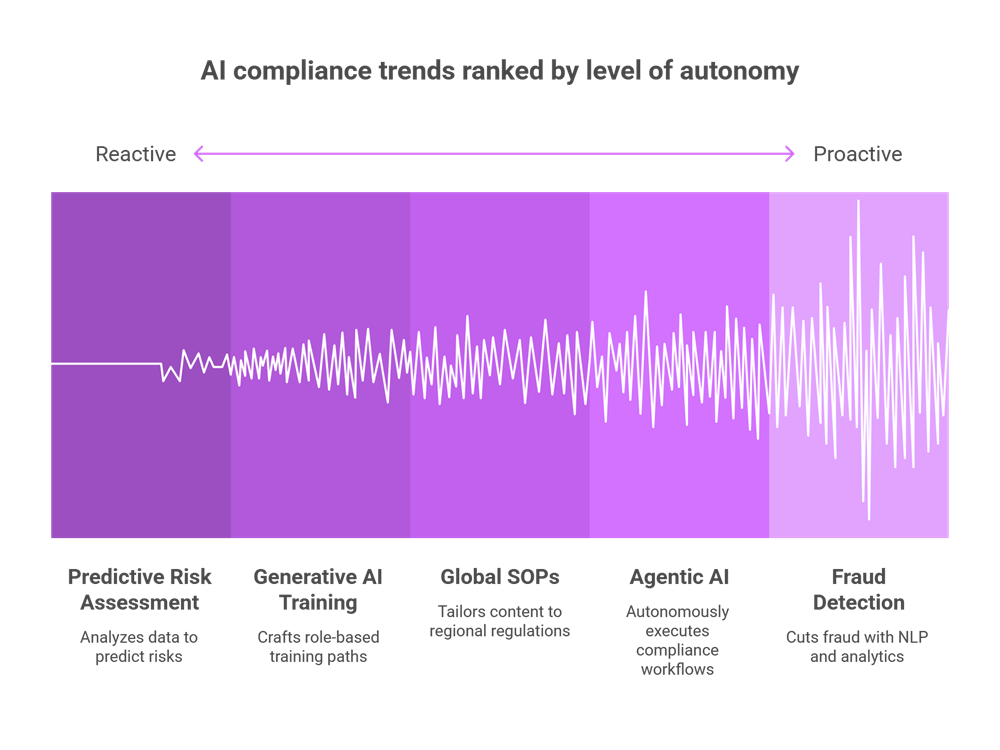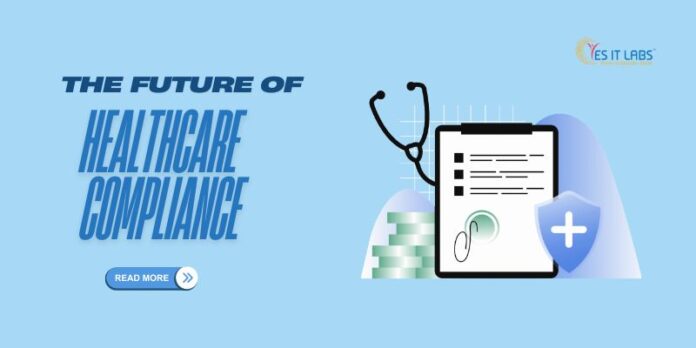In an era where healthcare regulations multiply faster than ever, think HIPAA, GDPR, and evolving FDA guidelines, staying compliant feels like navigating a regulatory minefield. But what if AI could turn that burden into a strategic superpower? As of 2025, many compliance officers in Europe, the Middle East, and Africa are already leveraging AI and generative AI for operational efficiency in life sciences compliance. This is not just hype. It is a game-changer that automates drudgery, predicts risks, and frees teams to focus on patient care. In this article, we will dive into the tools, trends, and insights shaping the future of healthcare compliance, backed by the latest stats to help you see why now is the time to get ahead.
The Compliance Crunch: Why Healthcare Needs AI Now More Than Ever
Healthcare compliance is not just paperwork. It is a massive annual headache for U.S. providers alone, with fines for violations averaging millions per incident. Manual processes, siloed data, and a deluge of global regulations create bottlenecks that slow down everything from billing to drug approvals. Lean teams struggle with error-prone audits, multilingual document reviews, and reactive risk management, often leading to delays and missed opportunities. Advances in healthcare software development are helping to streamline these challenges by building robust systems that prioritize regulatory adherence from the ground up.

Enter AI. By 2025, a majority of healthcare organizations are extensively using AI across operations, with the global market projected to hit tens of billions this year and soar even higher by 2030. In compliance specifically, AI shifts the paradigm from firefighting to foresight, automating up to 70 percent of routine tasks and slashing error rates by 40 percent in areas like claims processing. The result? Faster approvals, fewer penalties, and more time for what matters: innovation and patient outcomes.
How AI is Revolutionizing Healthcare Compliance
AI is not a buzzword. It is a toolkit that makes compliance proactive, personalized, and precise. At its core, machine learning and natural language processing sift through vast datasets to spot anomalies, while generative AI crafts tailored policies. Many organizations are turning to AI software development services to create bespoke solutions that embed compliance checks directly into their workflows, ensuring seamless scalability across diverse operations.
Benefits include efficiency gains, with audits and monitoring cutting processing time by 50 to 60 percent, allowing teams to handle two to three times more volume without added headcount. Risk reduction comes through predictive analytics that forecast compliance gaps before they become crises, potentially saving organizations millions in fines. Scalability follows, from small clinics to global pharma giants, with AI adapting to local regs while maintaining enterprise standards.
One standout insight: In recent surveys, over 80 percent of health executives predict generative AI will have a significant or moderate impact on operations in 2025, with compliance topping the list for efficiency boosts. This is not theoretical. Hospitals using AI for fraud detection have reported 25 to 30 percent drops in waste and abuse claims.
Must-Know AI-Powered Tools for Compliance in 2025
Ready to tool up? Here is a roundup of cutting-edge AI solutions tailored for healthcare compliance. We have focused on HIPAA-compliant options that deliver real ROI.
|
Tool |
Key Features | Best For |
Pricing Insight (2025 Est.) |
|
IBM Watson Health |
NLP for regulatory monitoring; predictive risk analytics; automated auditing of claims and EHRs. | Large providers tackling fraud and HIPAA audits. | Starts at $500/user/month; enterprise custom. |
|
TrueVault |
Automates DSAR handling; vendor compliance tracking; secure data encryption for PHI. | Privacy-focused teams ensuring GDPR/HIPAA alignment. | $0.10/GB stored; free tier for small practices. |
|
Aidoc |
ML-driven anomaly detection in imaging and billing; real-time compliance flagging. | Radiology and claims processing to prevent overbilling fines. | Subscription from $10K/year per facility. |
|
PathAI |
AI pathology analysis for compliant diagnostics; integrates with EHRs for audit trails. | Labs and hospitals streamlining FDA submissions. | Per-slide pricing ~$5-10; volume discounts. |
|
Dax Copilot |
Voice-to-text for notes with built-in compliance checks; flags potential violations in real-time. | Clinicians reducing documentation errors (up to 45% time savings). | $300/provider/month. |
These tools are not one-size-fits-all. Start with a pilot on high-pain areas like billing audits, where AI can flag 95 percent of non-compliant codes automatically. Pro tip: Integrate with FHIR APIs for seamless data flow, as mandated by ONC rules kicking in fully by 2027. For those seeking deeper customization, a custom software development service can tailor these platforms to fit unique institutional needs, enhancing overall efficacy.
How YES IT Labs Can Help
If you’re ready to harness AI for your healthcare compliance needs, YES IT Labs stands out as a trusted partner in this transformative space. As a leading U.S.-based software development firm founded in 2017, we specialize in crafting innovative solutions like AI-powered healthcare CRM systems and machine learning integrations that ensure seamless regulatory adherence. With a team of over 50 experts delivering cost-effective services at under $30 per hour, YES IT Labs empowers organizations, from startups to enterprises, to Building smarter medical apps, scalable platforms that drive efficiency and reduce risks. Whether it’s developing predictive analytics for fraud detection or automating audit workflows, our customer-oriented approach guarantees tailored results that align with HIPAA and beyond, making the leap to AI-driven compliance not just feasible, but future-proof.
Top Trends Shaping Compliance in 2025 and Beyond
The AI compliance landscape is evolving rapidly. Here is what to watch:


- Predictive Risk Assessment: Move beyond reactive audits. AI analyzes historical data to predict risks like adverse events or regulatory shifts, with tools spotting patterns in 80 percent less time. By 2026, expect more than half of organizations piloting AI for this, up from current levels.
- Generative AI for Personalized Training: Forget generic modules. AI crafts role-based paths, boosting retention by 35 percent and reducing violations from knowledge gaps. In 2025, nearly half of U.S. organizations are early adopters of gen AI here.
- Global SOPs with Local Twists: AI navigates cross-border regs, generating compliant content tailored to regions. This is crucial as a large majority of hospitals now use AI for operational tweaks.
- Agentic AI and Automation: Emerging “agentic” systems autonomously plan and execute compliance workflows, like auto-updating policies post-regulatory changes. These are poised to dominate by 2028.
- Fraud Detection and Privacy Boosts: With interconnected systems rising, AI’s NLP and analytics will cut fraud, waste, and abuse by 20 to 25 percent, but demand ironclad encryption to meet 2027 interoperability mandates.
Insight: AI adoption in healthcare leads all industries, with nearly all leaders viewing it as core to strategy. Yet only about two-thirds of physicians are fully onboard, highlighting a training gap to bridge.
Also Read: Innovations in Healthcare Software: Transforming the Future
Hurdles on the Horizon: Navigating AI’s Dark Side
AI is not flawless. Data bias can skew risk predictions, potentially amplifying disparities in underserved communities. Privacy risks loom large with gen AI’s data hunger, and implementation costs can hit six figures for mid-sized setups. Plus, evolving regs, like the EU AI Act, require “explainable AI” to avoid black-box fines.
The fix? Start small, audit algorithms regularly, and partner with compliant vendors. As one compliance expert notes, “AI amplifies human judgment. Do not replace it.” By addressing these, organizations can turn challenges into compliance edges.
Looking Ahead: A Compliant Tomorrow
By 2030, AI could automate 80 percent of compliance tasks, freeing professionals for strategic roles and cutting global fines by billions. The future? Smarter, safer healthcare where tech safeguards trust.
Ready to future-proof your program? Assess your stack against these tools, pilot one trend, and track ROI quarterly. Your patients, and your bottom line, will thank you. What is your first AI move? Share in the comments!

